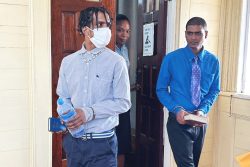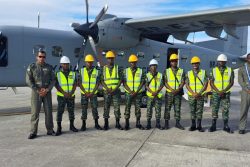Dear Editor,
Pondering on the significance of this year’s theme for Education Month, ‘Transforming the Nation through Inclusive Education,‘ I consider that it reflects the huge strides that have been made in the education sector and particularly within our public schools over the past years.
Being in the system for more than a decade, a young and budding teacher, I have seen many systems that have been tried and tested by the Ministry of Education in an effort to transform the academic spotlight of this nation. The torching of the Linden school, however, must be condemned since this affects our children’s potential to be the best they can.
Education Month 2012 stresses inclusive education; education whereby the teacher is geared and ready to teach the curriculum to all kinds of students – the weak, the not so weak, even the disabled.
Yes, tools and materials must be provided to teachers and educators to effectively transform inclusivity in curriculum delivery, but this is not what the theme focuses on.
Inclusivity means that every child of every background, religion, culture, economic and social condition, interest, and way of learning are all welcome in the classroom and within the walls of the school complex.
Inclusive education begs teachers to provide individualised attention to students without the (harmful) effects of separating learners from the task at times. Inclusive education confirms the acceptance of children with a wide array of academic, social, mental and other abilities and backgrounds, many of which affect their behaviour in the school environment.
The Ministry of Education’s after-school remediation drive and sixth-year transitional curriculum are just two of the initiatives that cater for inclusivity in the education system, which has come under heavy criticism from time to time. But the Ministry of Education is not sitting idly by and waiting for disaster to take place. I hope they are not.
And we tend to leave it all up to that body. Parents must get on board and work feverishly through their PTAs especially during Parent-Teacher Conferences and renew their interest and vigour to maximise the participation in this process called education.
Parents must not only be seen when it is time to collect school uniform vouchers or when their kid is beaten up by another student, or even when their kid is involved in some issue at the school.
Too often, the school has become the proverbial day-care, when parents breathe a sigh of relief to let go of their children when school reopens, since the parents‘ own lives are full of too much drama.
We have not, though, reached the zenith of inclusive education. We have much more work to do and more money will have to be spent.
The government, therefore, needs to have more counsellors in schools and welfare officers in the various districts to deal with the growing levels of social issues in our schools. There is a dearth of these professionals in the system and I was hoping that our new Minister would have acted more speedily in this regard. Teachers out there have numerous ideas on how to improve our education system.
Guyana’s schools could be more child-friendly and student- inclusive if parents, teachers, government and the community played their distinct yet combined roles, effectively.
When all is said and done, inclusive education is grounded and rooted in the classroom and to a larger extent, within the walls of a school. We can transform the education arena and this great nation through the strides and initiatives made by the Ministry of Education. Inclusive education to its max is a costly initiative and the government must invest heavily in this regard. Smaller classroom sizes, comfortable classrooms, the tools, and healthy learning environments can be a start. And the teachers will do the rest.
Yours faithfully,
Leon Suseran






